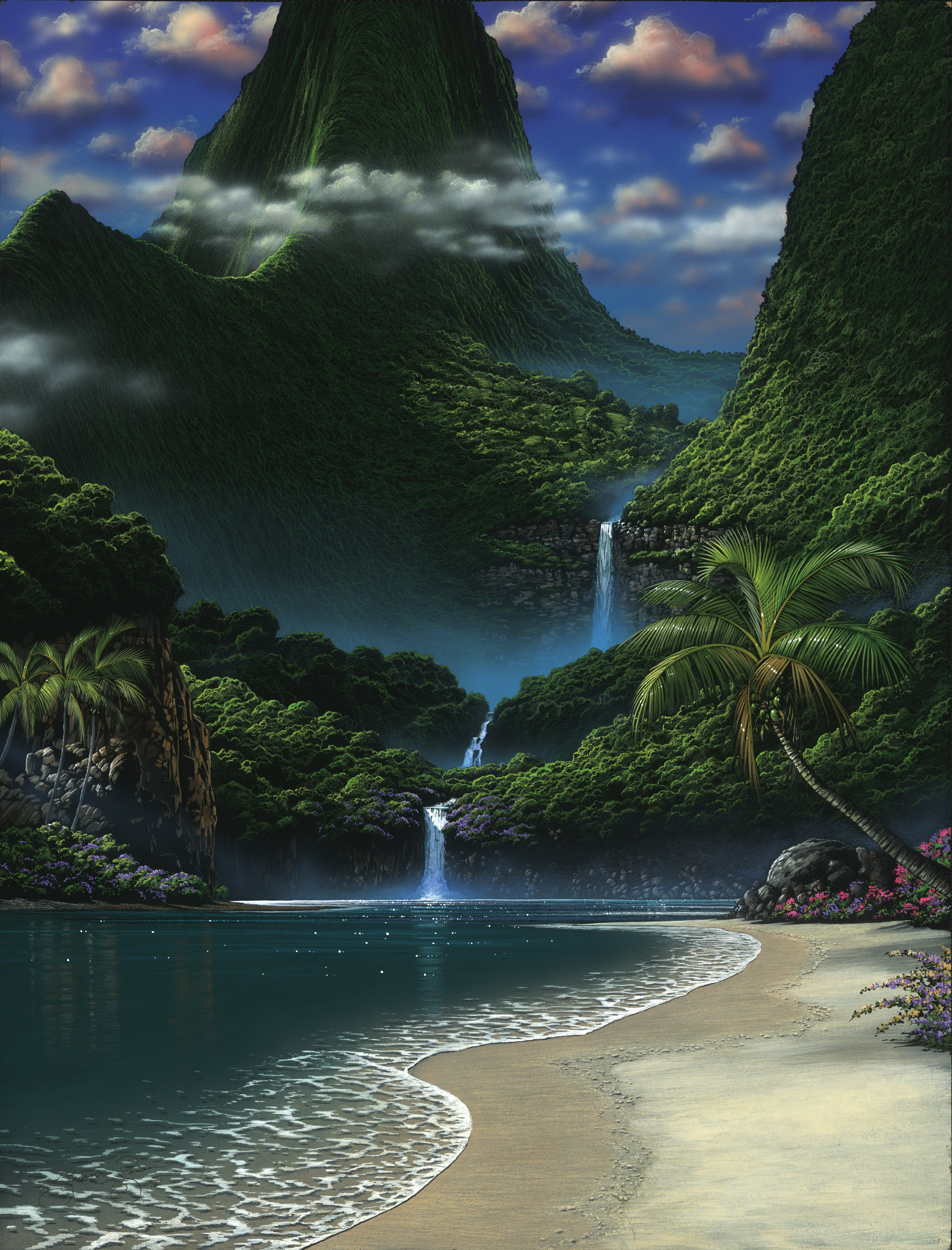"I do not necessarily judge your intentions to be unjust. But still, many have come here for many reasons, not all pure. What is it that brings you to the Isle of Dreams? What is it that you seek?"
-Spiritual Guide of Vaskalanu, Navya Rattan
Kalashtari Culture
The Dream-Walkers
In the Sun Soaked Sea, on a large and mysterious island, there exists a stone doorway, wreathed in mist, hidden beyond all help. This door's origins are forgotten to history, but it is no great secret that it connects to Sapanon, the Plane of Dreams. The Kalashton, wise but mischievous spirits that inhabit Sapanon, may move into the prime-material plane through this doorway, and from it, they go on to shape and influence the dreams of Kith across Adra. The presence of the spirits is strongest on the Isle of Dreams itself. Many years ago, a group of people arrived on the island by happenstance, escaping a ruinous storm. There they found a paradise, an island stocked with abundant food and water, and all who stayed there found peace, in their wake and their sleep. Eventually, those who stayed on the island began to change. Their physical features remained mostly the same, while their minds changed dramatically. Their souls became fused with wandering Kalashton, and these people became gifted with wisdom beyond their years. They became flat-faced and unexpressive, though simultaneously unpredictable and untethered from most norms. While the spirits of the Kalashton did not speak directly to their symbionts, they did instead perfectly meld with them, making any thought or will generated from one of these people an unconsciously combined effort. Strangest of all was that they did not dream, or rather, they did not dream their own dreams. They instead unconsciously travelled to the dreams of others, taking part as characters in another person's imaginations. These people named themselves after the spirits whom they melded with, and so they became known as the Kalashtari. Some left the island, seeking to separate themselves from the spirits, and after staying away from the Isle of Dreams for ten years, they found themselves free of the Kalashton. However, still many more embraced the change, and remained on the island. A large commune slowly developed on the island, called the Kalashtraum, with dozens of groups living on the various parts of the island, communing with nature and the plane of dreams to reach enlightenment. Their children, born to be normal members of their race, were able to decide whether or not to remain a part of the Kalashtraum, and become a Kalashtar, or leave, and live a life free from the influence of the Kalashton. Others deliberately came to the island in order to embrace the lifestyle. Those under the age of maturity did not become Kalashtar until that day arrived. Those of maturity only waited on the island a year and one day before bonding with a Kalashton.
The Kalashtari are a unique and exclusive cultural group. The culture belongs to those born on the Isle of Dreams, those who moved there, and those who have moved away. Still, this group is small enough comparatively that meeting a Kalashtari person is a vanishingly rare occurence for most people. Kalashtari practice meditation, as a way of remaining constantly in-tune with both their own body and mind, but also the soul of their Kalashton spirit. Kalashtari are often dispassionate and stoic, while the Kalashton are chaotic and free-spirited. Kalashtari seem to form to meet the churning storm that is their paired Kalashton partner, at first almost innately, but eventually with practice and discipline. Meditation is one means of this, as is their spartan diet and exercise routine, constantly maintaining their bodies in peak health. The Kalashtari do not believe in ownership of the land, or in mercantile trade. Instead, they live in non-hierarchical communes across their island, coming to decisions through long-term consideration and consensus. They also tend to be poor in martial pursuits, due to their pensive tendencies, but these same qualities make them fine wielders of magic, both arcane and divine in nature. They tend to be wary of outsiders, both because outsiders tend to clash with their culture and way of life, but also because outsiders have often in the past come to the Isle of Dreams to exploit the Kalashtari, and the island's magical properties. As such, any outsiders on the island are watched carefully, and are only allowed inland if they are well-trusted by the Kalashtari. It is traditional for young adult Kalashtari to leave their island at some point to experience the wider world, and decide whether they wish to leave permanently, or return home. These young Kalashtari tend to go adventuring, taken by their wanderlust, and therefore among adventurers, Kalashtari are more represented than in the general population. In general, the Kalashtari are enigmatic, but harmless. However, occasionally a foul Kalashton, a spirit of nightmares, will corrupt a Kalashtar to be extremely aloof, chaotic, and violent. These dark-Kalashtari look just like the rest of their kin, only distinguished by their character. Rooting these evil entities out of the Isle of Dreams is an ever-turning struggle of this people.
The Kalashtari people are most highly concentrated on the Isle of Dreams, a large island between the Dragon-Tail Islands and the Flaring Islands. Kalashtari are also found serving as adventurers and clerics scattered throughout the rest of Adra. The races of the Kalashtari Culture are most predominately Kalashtar, which themselves are plane-touched members of a variety of races, most commonly humans, elves, half-elves, half-orcs, halflings, and gnomes. The Kalashtari as a people are somewhat areligious - there are certainly those that choose gods of their own to have faith it, but the symbiosis with Kalashton usually pushes out the Kith desire for belief in a higher power. Kalashtari tend to be dispassionate, contemplative, and robust. They also tend to be xenophobic, dry, and dull. The dominant language among the Kalashtari is Celestial, but many speak Primordial as well.
If you choose the Kalashtari Culture, you gain the following:
~Either a +1 to your Wisdom score or a +1 to your Constitution score~
~A -1 to your Charisma score~
~As a known language, either Celestial or Primordial~
~A Sub-Discipline in every knowledge skill on checks relating to Kalashtari Culture~
Back to Cultures of Qualaxi
Back to Culture
Back to Expanded Backgrounds
Back to Adra - 3rd Era World Guide

